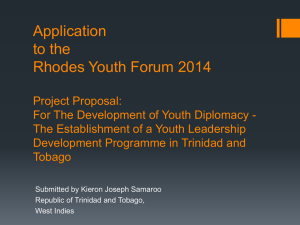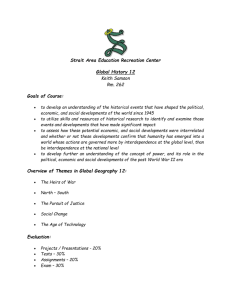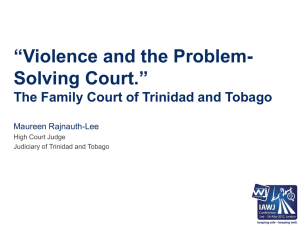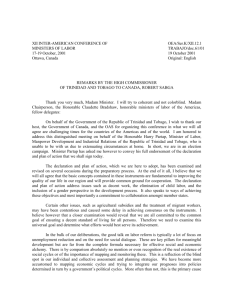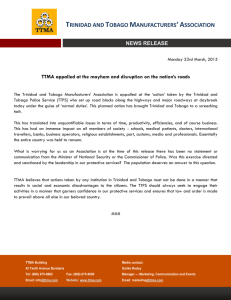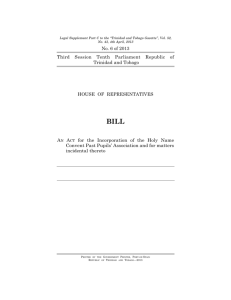A SEARCH FOR STANDARDS IN THE FIELD OF TEACHER
advertisement
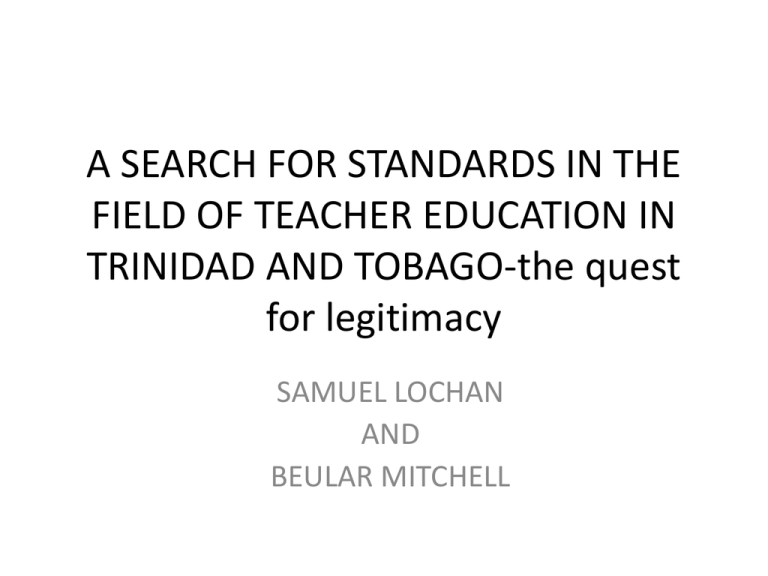
A SEARCH FOR STANDARDS IN THE FIELD OF TEACHER EDUCATION IN TRINIDAD AND TOBAGO-the quest for legitimacy SAMUEL LOCHAN AND BEULAR MITCHELL Increased complexity of the field of teacher education • More offerings at undergraduate and postgraduate levels • Online offerings • Blended offerings • More foreign providers • • • • • • SOE/UWI UTT USC ROYTEC SHEFFIELD/BAPOS CREDI Missing ingredient? Clearly articulated public standards for teachers and the preparation of teachers and a governing body to manage the field of teacher education. Since 1960 there has been a Joint Board for Teacher Education managed by UWI, Mona Some positive recent developments • Pre-service teacher education compulsory at the primary level • A Teacher Performance and Teacher Development Unit was established at the MOE • Professional Development had been made part of the Seamless Development Project EXAMINING THE LOCAL CONTEXT The Case of B.Ed Primary B.Ed Primary Programmes by different providers INSIGHTS GAINED/ POINTS OF DIFFERENCE • There is diversity in the programmes – Content/curricula – Duration – Delivery – Assessment – Entry requirements A Look at the International Front History of Quality Assurance in Teacher Education Time periods What constitutes standards Institutions driving standards 1960-1980 Training agenda- school effectiveness studies Benign state control with a lot of institutional independence 1980-2000 Teacher learning agendareflective practitioner, empowerment, social justice, learning communities, highs standards for teacher education The teaching profession and the institutions of teacher preparation viz. Universities 1990-present Policy Agenda-High accountability standards emphasis on outcomes such as student grades, de- Contestation between states, profession and institutions for control over standards Three Main Approaches to Governance in Teacher Education. Institutional governance-management by well established university system Professional Governance- management by strong independent professional organizations Political Governance- management by ministries or government Comparative models of Quality Assurance in Teacher Education Negotiated Settlements Standards setting and arrangements for governance are really achieved through negotiated settlements between contending agencies at different points in time. Standards may change and the governance arrangements may change as the as the social and political forces change and as the research agenda develops to shape policy and practice. Negotiated settlement in the USA • The case of the USA is very instructive. There are a lot of professional organizations that have been very vocal and active in education; NCATE is more than 50 years old, there are teachers unions that are strong and active, subject teachers associations in maths, science, social studies; ASCD; ATE. • States all have their high stakes test to determine employment as teachers. The Federal Government exerts influence through funding and can impact on all aspects of education and teacher education e.g. “No child left behind” and “ Nation at Risk” (1983). There also private agencies like Fordham foundation that influence teacher education. Thus in the USA the governance and standards for the teaching profession is shared between Federal Government, Individual states, Universities and professional organizations and private institutions. Developments in the Region Regional Developments • OAS Teacher Education Hemispheric Project(2004) • Draft Harmonized Policy Framework for Teacher Education in the Caribbean The Harmonized Policy Framework • • • • Selection and Recruitment Initial Formation In-service Teacher Education Teacher Evaluation and Certification Regional Developments • Proposal for the Establishment of a Caribbean Community Council for Teaching and Teacher Education (CCCTTE) • Proposal for the National Council for Teaching and Teacher Education(NCTTE) • Development of Regional Standards of Practice for the Teaching Profession Functions of the CCCTTE • Teachers – To develop guidelines for assessing teaching performance standards – To establish criteria for teaching – To develop guidelines for the management of a teacher development system – To coordinate partnerships – To develop guidelines and strategies for attracting and retaining suitably qualified teachers Issues to consider in the way forward in Trinidad and Tobago • Work has been done at the Regional Level • Standards only have legitimacy if they reflect how relevant stakeholders think and feel • Standards have to reflect the culture and context and the needs of the society • The globalization agenda may conflict with the need to address culture and context Issues to consider in the way forward in Trinidad and Tobago • How do you get meaningful participation in a weak professional culture? • What is the relative strength of relevant stakeholders; tertiary providers, State, denominational boards, parents, TTUTA, Administrators, other private agencies and NGO’s • Need to set up mechanism for propelling the discourse
